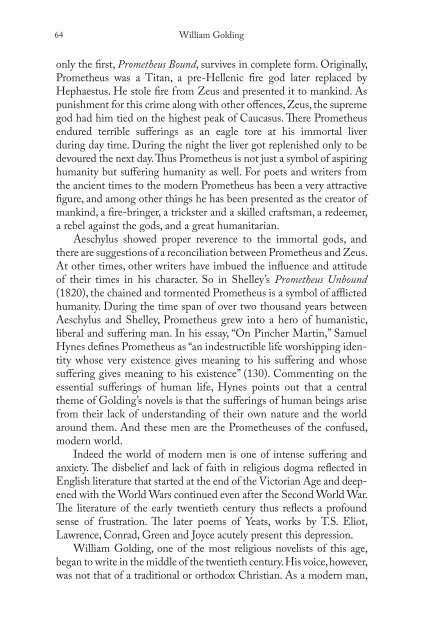Blooms Literary Themes - THE TRICKSTER.pdf - ymerleksi - home
Blooms Literary Themes - THE TRICKSTER.pdf - ymerleksi - home
Blooms Literary Themes - THE TRICKSTER.pdf - ymerleksi - home
You also want an ePaper? Increase the reach of your titles
YUMPU automatically turns print PDFs into web optimized ePapers that Google loves.
64<br />
William Golding<br />
only the fi rst, Prometheus Bound, survives in complete form. Originally,<br />
Prometheus was a Titan, a pre-Hellenic fi re god later replaced by<br />
Hephaestus. He stole fi re from Zeus and presented it to mankind. As<br />
punishment for this crime along with other off ences, Zeus, the supreme<br />
god had him tied on the highest peak of Caucasus. Th ere Prometheus<br />
endured terrible suff erings as an eagle tore at his immortal liver<br />
during day time. During the night the liver got replenished only to be<br />
devoured the next day. Th us Prometheus is not just a symbol of aspiring<br />
humanity but suff ering humanity as well. For poets and writers from<br />
the ancient times to the modern Prometheus has been a very attractive<br />
fi gure, and among other things he has been presented as the creator of<br />
mankind, a fi re-bringer, a trickster and a skilled craftsman, a redeemer,<br />
a rebel against the gods, and a great humanitarian.<br />
Aeschylus showed proper reverence to the immortal gods, and<br />
there are suggestions of a reconciliation between Prometheus and Zeus.<br />
At other times, other writers have imbued the infl uence and attitude<br />
of their times in his character. So in Shelley’s Prometheus Unbound<br />
(1820), the chained and tormented Prometheus is a symbol of affl icted<br />
humanity. During the time span of over two thousand years between<br />
Aeschylus and Shelley, Prometheus grew into a hero of humanistic,<br />
liberal and suff ering man. In his essay, “On Pincher Martin,” Samuel<br />
Hynes defi nes Prometheus as “an indestructible life worshipping identity<br />
whose very existence gives meaning to his suff ering and whose<br />
suff ering gives meaning to his existence” (130). Commenting on the<br />
essential suff erings of human life, Hynes points out that a central<br />
theme of Golding’s novels is that the suff erings of human beings arise<br />
from their lack of understanding of their own nature and the world<br />
around them. And these men are the Prometheuses of the confused,<br />
modern world.<br />
Indeed the world of modern men is one of intense suff ering and<br />
anxiety. Th e disbelief and lack of faith in religious dogma refl ected in<br />
English literature that started at the end of the Victorian Age and deepened<br />
with the World Wars continued even after the Second World War.<br />
Th e literature of the early twentieth century thus refl ects a profound<br />
sense of frustration. Th e later poems of Yeats, works by T.S. Eliot,<br />
Lawrence, Conrad, Green and Joyce acutely present this depression.<br />
William Golding, one of the most religious novelists of this age,<br />
began to write in the middle of the twentieth century. His voice, however,<br />
was not that of a traditional or orthodox Christian. As a modern man,

















